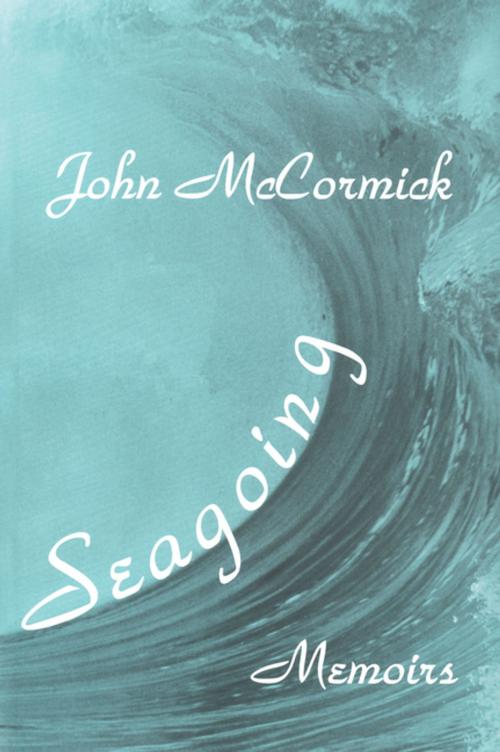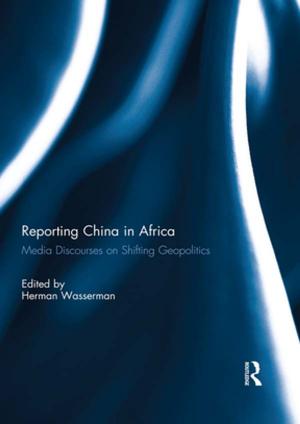| Author: | ISBN: | 9781351326780 | |
| Publisher: | Taylor and Francis | Publication: | April 17, 2018 |
| Imprint: | Routledge | Language: | English |
| Author: | |
| ISBN: | 9781351326780 |
| Publisher: | Taylor and Francis |
| Publication: | April 17, 2018 |
| Imprint: | Routledge |
| Language: | English |
"The great virtue of McCormick's memoirs is their blunt honesty. He writes with a persuasive directness about what happened to him and what he believes..."--Arts and Letters
The title of John McCormick's autobiographical book, may be taken both literally and symbolically. In a literal sense, going to sea was an early and powerful ambition, while seagoing is also a metaphor for the twists and turns in a rootless life, a long voyaging. This is not a conventional autobiography. It is personal only as necessary for continuity, and never confessional. The essays center upon telling episodes in the author's life and strive for objectivity and accuracy about the recent past, both personal and historical. He does so, as he writes, without "any pretension of producing a true history." The events of his life are necessarily unique to him, thus he finds uniqueness in the events that impinged upon him.
McCormick begins with his early years, growing up in the American mid-West during the Depression, a time of broken family relations and random jobs. He relates his falling away from religious faith. He describes his first experience as a sailor in a tanker, which gave him physical liberation, a world free of constrictions, as with Hemingway. In discussing his early teaching experience, he gives a vivid portrayal of Germany in the immediate postwar years, along with observations of residual pro-Hitler sentiment and the awkward circumstances (for Germans) of the immediate past. He devotes a chapter to a moving memoir of his friend Francis Fergusson, eminent Rutgers University scholar. McCormick also relates his experience as an amateur bullfighter and reiterates his defense of bullfighting as an art. He paints a vivid picture of an adventure at sea while working on a definitive biography of George Santayana, reflecting also on changes in the genre of biography, with its prevailing emphasis on trivia and sensationalism. In describing his retirement to England, McCormick describes the conflict between nationalism and expatriation. He punctuates details of his naval war experiences with thoughtful observations on military combat. Finally, in his closing chapter, "Coda: Closet Space," McCormick attempts to make sense of old age and death.
This autobiographical account of a well-lived life encompasses far more than a splendid teaching and literary career. It will provide insight and good reading for those who know McCormick's scholarly work, for students of the humanities, and for the general public interested in vivid prose.
John McCormick is professor emeritus of comparative literature at Rutgers University, and honorary fellow of English and literature at the University of York. He is the author of George Santayana: A Biography, Catastrophe and Imagination, The Middle Distance, and Fiction as Knowledge.
"The great virtue of McCormick's memoirs is their blunt honesty. He writes with a persuasive directness about what happened to him and what he believes..."--Arts and Letters
The title of John McCormick's autobiographical book, may be taken both literally and symbolically. In a literal sense, going to sea was an early and powerful ambition, while seagoing is also a metaphor for the twists and turns in a rootless life, a long voyaging. This is not a conventional autobiography. It is personal only as necessary for continuity, and never confessional. The essays center upon telling episodes in the author's life and strive for objectivity and accuracy about the recent past, both personal and historical. He does so, as he writes, without "any pretension of producing a true history." The events of his life are necessarily unique to him, thus he finds uniqueness in the events that impinged upon him.
McCormick begins with his early years, growing up in the American mid-West during the Depression, a time of broken family relations and random jobs. He relates his falling away from religious faith. He describes his first experience as a sailor in a tanker, which gave him physical liberation, a world free of constrictions, as with Hemingway. In discussing his early teaching experience, he gives a vivid portrayal of Germany in the immediate postwar years, along with observations of residual pro-Hitler sentiment and the awkward circumstances (for Germans) of the immediate past. He devotes a chapter to a moving memoir of his friend Francis Fergusson, eminent Rutgers University scholar. McCormick also relates his experience as an amateur bullfighter and reiterates his defense of bullfighting as an art. He paints a vivid picture of an adventure at sea while working on a definitive biography of George Santayana, reflecting also on changes in the genre of biography, with its prevailing emphasis on trivia and sensationalism. In describing his retirement to England, McCormick describes the conflict between nationalism and expatriation. He punctuates details of his naval war experiences with thoughtful observations on military combat. Finally, in his closing chapter, "Coda: Closet Space," McCormick attempts to make sense of old age and death.
This autobiographical account of a well-lived life encompasses far more than a splendid teaching and literary career. It will provide insight and good reading for those who know McCormick's scholarly work, for students of the humanities, and for the general public interested in vivid prose.
John McCormick is professor emeritus of comparative literature at Rutgers University, and honorary fellow of English and literature at the University of York. He is the author of George Santayana: A Biography, Catastrophe and Imagination, The Middle Distance, and Fiction as Knowledge.















